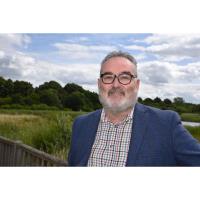Highland Carbon Reflect On Earth Day and How They Help Businesses Make A Difference For Our Planet
With a business model that is explicitly geared towards looking after the environment, every day is Earth Day for Highland Carbon. Yet, as the global event rapidly approaches (22nd April), Managing Director Richard Clarke has reflected on what it truly means:
"The predictions that I was taught during university in the 1980s about what was then called ‘Global Warming’ have already come to pass. The ice sheets and glaciers have retreated. The seas have warmed (bleaching coral reefs) and sea levels have already risen.
"This has brought an increase in coastal erosion and the beginning of flooding events in coastal cities, such as New York and New Orleans. The intensity and frequency of extreme weather events have increased; with more hurricanes and typhoons per season. Hurricanes have begun to be reported in the South Atlantic for the first time. The distribution and intensity of wildfire events have increased. The predictability of arable farming has decreased. The mass migration of people has increased. Global average temperature has both increased and it continues to do so.
"When I was a student during the 1980s, I was one of the instigators of the first Earth Day festival on our campus at Michigan State University. We created a music festival to which we invited environmental charities and university environmental clubs (such as the Audubon Society, Sierra Club and others) to take part. The event was a big success and helped our later campaign to convince the university to initiate a recycling programme.
"Earth Day is even more relevant today. The good news is that the public and companies are far more aware of environmental issues such as climate change, the persistence of plastics in the nature, water pollution and extinction.
"Turning the picture to the UK in particular, did you know that it is one of the least forested nations in Europe? That is, with the exception of Iceland, which itself is in the arctic circle! Unforested hills that are emblematic of Scotland, Wales and northern England are not as they once were. Following the last ice-age, the majority of the UK was forested. According to David Attenborough, a squirrel could once travel from Dover to John O'Groats without ever touching the ground.
"Nature-based solutions are a key part of the toolbox to mitigate climate change. The UK Government has set a target to increase forest cover from 13% to 17% as part of its commitment to the United Nations - Paris Agreement, and we are keen to play our part.
"Highland Carbon supplies vast forest projects in inspirational landscapes. We apply science to decide where and how to restore native forests. One project alone can include more than one million trees. We reintroduce rare tree species as part of these diverse schemes. These new habitats complement existing Nature Reserves, Sites of Special Scientific Interest, UN Biospheres and more. They directly benefit a range of rare species in order to help to mitigate and reverse local extinction.
"Of course, these new forests sequester significant carbon dioxide, a greenhouse gas, from the atmosphere. They local-up carbon in the biomass of their trunks, branches and roots. Thus, we are able to supply officially recognised and conservation-grade carbon units to our company clients. This is more important than ever as the planet continues to warm.
"Contact Highland Carbon today for more information on the carbon units that are available and the official hallmarks that they bring to your company reporting: richard@highlandcarbon.com You will find it a great comfort to become part of the solution."
Highland Carbon
-
Richard Clarke Managing Director
- April 17, 2024
- 0-742-710-4451
- Send Email
